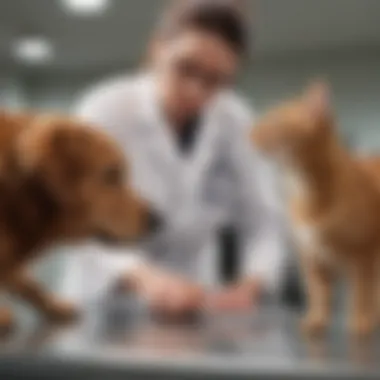Understanding Bowel Blockages in Pets: Causes and Treatments


Intro
Bowel blockages in pets can pose a significant health risk, often requiring immediate veterinary attention. Understanding the factors leading to such obstructions is essential for responsible pet ownership. The ability to identify early symptoms and seek timely medical help can greatly affect outcomes. This article aims to shed light on the causes, symptoms, and treatments of bowel blockages in pets, contributing to a deeper understanding of a potentially life-threatening condition.
Understanding Your Pet
To effectively prevent and respond to bowel blockages, it is vital for pet owners to grasp the unique traits and needs of their pets.
Breed Traits
Different breeds may be prone to various health issues, including bowel blockages. For instance, some small breed dogs like Yorkshire Terriers or Chihuahuas may often ingest foreign objects due to their curious nature. Larger breeds, on the other hand, might suffer from blockages caused by tumors or dietary indiscretions. Knowing the breed-specific tendencies can help owners take preventive measures.
Common Temperaments
Understanding a pet's temperament is crucial when evaluating their tendencies. An anxious cat might ingest non-food items, leading to a blockage, while energetic dogs might chew on inappropriate objects. Being aware of how a pet behaves can guide owners in shaping their environment to minimize risks.
Special Needs
Some pets might have specific dietary or health requirements that could influence bowel health. For example, pets with previous digestive issues may need special diets, thus reducing the likelihood of blockages. Regular veterinary check-ups are essential in monitoring these health needs.
Pet Care Essentials
Basic knowledge of pet care is crucial for preventing bowel issues.
Nutrition and Feeding Guidelines
A balanced diet tailored to a pet's age, breed, and health is essential. Consider incorporating high-quality, digestible ingredients to support a healthy digestive system. Avoid giving pets access to table scraps or human food, which can lead to blockages.
Grooming Tips and Techniques
Regular grooming can also play a role in preventing gastrointestinal issues, especially in long-haired breeds. Hairballs in cats or ingested fur in dogs can lead to blockages. Routine brushing can mitigate this problem by reducing loose fur in the home.
Health and Wellness
Consistent veterinary care, including vaccinations and parasite control, keeps pets healthier overall. Awareness of any sudden changes in behavior or weight can help in early detection of underlying health problems, including bowel issues.
Training and Behavior
Proper training shapes behavior and can reduce the likelihood of blockages through prevention of harmful habits.
Basic Training Techniques
Using positive reinforcement, like treats and praise, can establish commands that train pets to avoid harmful objects or behaviors. This can include learning commands like
Preamble to Bowel Blockages in Pets
Bowel blockages in pets pose a significant health risk. Understanding this condition is essential for pet owners. Bowel obstructions can lead to severe complications if not addressed promptly. Recognizing the signs and responding swiftly can be lifesaving for a pet.
This article aims to provide a comprehensive overview of bowel blockages. We will discuss causes, symptoms, diagnostic methods, and treatment options. By raising awareness, we empower pet owners to act when symptoms appear.
Symptoms of bowel obstruction can be subtle early on, making knowledge critical. Timely intervention can prevent severe outcomes, including surgery or even death. Familiarity with this subject benefits both current pet owners and those seeking to adopt.
The information shared here focuses on practical, actionable insights. We highlight key indicators and emphasize the importance of regular veterinary checkups. The discussion also addresses preventive measures that can mitigate risks for pets. Ultimately, this article serves as a significant resource for anyone invested in the health of pets.
Each pet owner must take responsibility for recognizing health issues. This awareness can be the difference between swift treatment and serious complications.
In the subsequent sections, we will explore the complexity of bowel blockages in detail. By the end of this article, readers will have a thorough understanding of a crucial health issue facing their pets.


Understanding Bowel Blockages
Bowel blockages in pets can create a range of significant health issues. Understanding this condition is essential for pet owners, veterinarians, and animal enthusiasts. Awareness of bowel blockages not only helps in recognizing early symptoms but also assists in effective treatment and management.
Bowel blockages occur when the intestinal tract becomes obstructed. This can prevent normal digestive processes and force waste to accumulate. Ultimately, prompt attention is critical because delays can lead to serious health implications, including perforation of the intestine and severe infections.
Importance of Understanding Bowel Blockages
Understanding bowel blockages is crucial for several reasons:
- Early Detection: Awareness of the symptoms allows for timely diagnosis and treatment, which can be life-saving.
- Informed Decision-Making: Pets are dependent on their owners to recognize when something is wrong. An informed owner can make better decisions when seeking veterinary help.
- Prevention: Understanding the causes can help pet owners take proactive measures to reduce the risk of blockages, creating a safer environment for their pets.
Benefits of Understanding Bowel Blockages
- Enhanced Communication with Vets: Knowledge of the signs and risks of bowel blockages facilitates better discussion with veterinarians. It enables owners to provide detailed information, which could aid in a quicker diagnosis.
- Improved Pet Care: By understanding what contributes to bowel issues, pet owners can modify their pet's diet or habits. For example, avoiding certain foods or preventing access to small objects can significantly cut the risk.
- Emotional and Financial Preparedness: Pet owners who are aware of this condition can be better prepared emotionally and financially for potential veterinary visits. They are aware that treatment may range from non-invasive approaches to surgical interventions.
"Knowledge is the first step in ensuring the health and safety of your pet. An informed pet owner is a proactive pet owner."
Common Causes of Bowel Blockages
Bowel blockages in pets can emerge from various sources. Understanding these causes is critical for pet owners. Identifying factors that contribute to blockages can lead to timely intervention, reducing potentially serious health risks. Blockages happen when material accumulates in the intestines. This accumulation leads to discomfort and can trigger a chain reaction. Knowing the common causes allows owners to monitor their pets more closely and take preventive measures. The significance of recognizing these causes cannot be understated, especially for the overall health and well-being of pets.
Foreign Objects
Pets, especially dogs, are known for their inquisitive nature. This curiosity often leads them to ingest items that are not food. Common foreign objects include:
- Toys: Certain dog toys may break apart and be swallowed.
- Clothing: Socks or pieces of clothing can become lodged.
- Foil or Plastic Wrappers: Pets might eat packaging materials.
- Wood or Bones: Splintered wood can cause sharp blockages.
When foreign objects enter the intestinal tract, they can cause an obstruction. Symptoms may include vomiting, lack of appetite, or lethargy. If owners suspect their pet has ingested something foreign, a vet visit is essential. At times, surgical intervention may be necessary to remove the blockage.
Intestinal Parasites
Intestinal parasites are another significant cause of bowel blockages. These parasites can consume nutrients and disrupt healthy digestion. Common parasites include:
- Roundworms: Common in puppies, they can cause physical blockage.
- Tapeworms: These are more common in older pets and can cause discomfort.
- Hookworms: They attach to the intestinal wall, causing inflammation.
Infected pets might display symptoms like diarrhea, vomiting, or weight loss. Regular deworming is an important preventive measure. Consulting a vet for a proper diagnosis is vital. If left untreated, these parasites can cause severe health issues.
Tumors and Growths
Tumors and growths within the gastrointestinal tract can lead to obstructions. Both benign and malignant tumors can cause significant issues. Some signs that a pet may have such growths include:
- Persistent Vomiting: Regular vomiting can indicate a growth.
- Weight Loss: Unexplained weight loss should be investigated.
- Abdominal Swelling: This may be a sign of internal growths.
Veterinarians commonly utilize imaging techniques to assess any suspicious growths. Depending on the diagnosis, treatment options can range from monitoring to surgical removal of the tumor.
Scar Tissue and Inflammation
Scar tissue and inflammation within the intestines is another potential cause of bowel blockages. This scar tissue can result from previous surgeries, injuries, or inflammatory bowel diseases. Symptoms may include:
- Chronic Vomiting: Ongoing nausea or vomiting may occur.
- Changes in Stool Consistency: Altered bowel movements can signal problems.
- Abdominal Discomfort: Pets may show signs of pain when touched.
Vets often recommend imaging studies to assess the extent of scar tissue. Treatment may involve medication or, in some cases, surgery to remove affected portions of the intestines.
Understanding these common causes empowers pet owners. With knowledge of symptoms and when to seek veterinary help, owners can play a critical role in their pet’s health. Monitoring for these conditions fosters better outcomes and may prevent severe complications.
Typical Symptoms Indicating a Bowel Blockage
Recognizing the symptoms of a bowel blockage in pets is vital for early diagnosis and treatment. Understanding these signs can make a significant difference in your pet's outcome. When a blockage occurs, timely intervention often determines the health trajectory of your companion. Knowledge about symptoms not only aids in prompt action but also gives pet owners confidence in monitoring their pet's wellbeing.


Vomiting and Nausea
Vomiting is one of the first indicators of a bowel blockage. It may appear repeatedly, often alongside nausea. A pet may retch without bringing anything up, indicating that their gastrointestinal tract is not functioning as it should. Observation is key when noticing these symptoms. Not all vomiting means a blockage, but if combined with other symptoms, it raises concerns.
Be aware, persistent vomiting can lead to dehydration. This can complicate the situation further. If your pet shows signs of vomiting and exhibits reluctance to eat, immediate veterinary attention is warranted.
Abdominal Pain and Distension
Physical signs of discomfort may manifest as abdominal pain. Your pet might exhibit changes in behavior, like whimpering or a stiff posture. Abdominal distension, or bloating, can occur due to the buildup of gas and fluid around the obstruction. A distended abdomen is often noticeable when you run your hands over the area.
This discomfort not only makes your pet feel uneasy but may also indicate severe underlying issues that need addressing. A thorough examination by a vet can help confirm the presence of pain and assess the severity of any blockage.
Loss of Appetite
A sudden change in your pet's eating habits could signal a problem. Loss of appetite is regularly seen in pets experiencing bowel blockages. Pets that once eagerly awaited meals may suddenly show no interest in food, which is alarming for any pet owner. This lack of appetite doesn’t occur in isolation; often, it correlates with other symptoms like vomiting or pain.
It's important to note that loss of appetite can stem from various conditions besides blockages. However, if this symptom appears alongside others discussed, veterinary consultation is urgent.
Change in Bowel Movements
Bowel movement alterations play a significant role in indicating a bowel blockage. You may notice that your pet exhibits infrequent defecation. In some cases, they may strain while trying to eliminate without success. Both circumstances suggest that something is obstructing the passage.
Additionally, if your pet produces any abnormal stool, such as small or hard pellets, it can indicate this issue. Tracking bowel patterns ensures pet owners can take proactive and informed actions in response to potential blockages.
Timely recognition of symptoms can be life-saving. If your pet exhibits any combination of these signs, prioritize a visit to the vet to ensure prompt treatment and care.
Diagnostic Procedures for Bowel Blockages
Understanding the diagnostic procedures for bowel blockages is crucial. These methods help veterinarians pinpoint the exact nature and location of the blockage in a pet's gastrointestinal tract. Early and accurate diagnosis directly affects the treatment options available and overall prognosis. Ineffective or delayed diagnosis can allow the condition to worsen, leading to severe health risks. Therefore, knowing the procedures involved can empower pet owners to seek timely veterinary intervention.
Physical Examination
A thorough physical examination is the first step in diagnosing bowel blockages. The veterinarian will palpate the abdomen to check for abnormal swelling or pain. This assessment provides initial clues about the suffering pet's condition. Careful observation can reveal signs of discomfort, which may indicate the severity of the blockage. Additionally, the vet will inquire about the pet's recent behavior, eating habits, and bowel movements to better understand the situation. This initial evaluation often informs the decision on further diagnostic tests.
Imaging Techniques
Imaging techniques are vital for visualizing internal structures and identifying blockages more clearly. Two of the most commonly used methods are X-rays and ultrasound. These technologies offer non-invasive means for veterinarians to gain insights into the pet's health. Each offers unique benefits for diagnosis, often complementing each other in providing a comprehensive understanding.
X-rays
X-rays provide a quick snapshot of the gastrointestinal tract. They help veterinarians see if foreign objects obstruct the bowel or if there are symptoms of other issues like tumors. A key characteristic of X-rays is their ability to highlight areas of gas accumulation. This can indicate a blockage, as gas may build up behind an obstruction.
The beneficial aspect of X-rays is their speed and convenience. They require minimal preparation from the pet. However, X-rays have limitations. They may not always provide detailed images of soft tissues. This can lead to missed diagnoses, making subsequent imaging necessary.
Ultrasound
Ultrasound enhances visualization of soft tissues and allows for real-time imaging. It excels at showing the motility of the intestines, which is important in assessing bowel function. A key characteristic of ultrasound is its non-invasive nature and lack of ionizing radiation.
This method is popular because it can provide a wealth of information quickly. It can detect fluid accumulation or inflammation that may require immediate attention. Yet, ultrasound requires trained personnel for accurate interpretation. Additionally, some pets may need sedation, which can complicate the procedure.
Endoscopy
Endoscopy is a minimally invasive procedure that enables direct visualization of the gastrointestinal tract. With this technique, a flexible tube with a camera is inserted through the mouth or rectum. This method provides detailed images of the internal environment, allowing veterinarians to locate blockages precisely.
Endoscopy has significant advantages. It offers the ability to take biopsy samples or even remove foreign objects. However, it usually requires anesthesia, which carries inherent risks. The availability of this procedure can also vary by veterinary practice.
Understanding diagnostic procedures is vital for timely treatment. Early identification of bowel blockages can greatly improve outcomes for pets.


Treatment Options for Bowel Blockages
Addressing bowel blockages in pets requires a nuanced understanding of the treatment options available. The nature of the blockage, whether it is due to a foreign object, tumor, or another cause, significantly influences the recommended approach. Timely intervention is crucial to prevent further complications, such as damage to the intestines or infection, thus underscoring the importance of recognizing signs early.
Medical Management
Medical management refers to the non-surgical approach to treat bowel blockages. This may include the use of medications to alleviate symptoms and promote intestinal motility. Common treatments can involve:
- Fluid Therapy: Administering fluids intravenously can help rehydrate the pet and support digestive function.
- Medications: Laxatives or anti-nausea medications can sometimes be prescribed to ease symptoms.
- Dietary Adjustments: Changing the pet’s diet temporarily may aid in resolving milder blockages. Well-formulated diets can help in managing gastrointestinal health.
It is important to recognize that medical management is suitable primarily for cases where the blockage is not severe or life-threatening. In these situations, monitoring the pet closely while following the vet’s recommendations can lead to a positive outcome. Still, pet owners must be vigilant and seek further veterinary care if the condition does not improve.
Surgical Intervention
When medical management is not successful, or the blockage poses a serious risk to the pet's health, surgical intervention becomes necessary. This procedure typically involves:
- Laparotomy: A surgical incision in the abdomen allows the veterinarian to directly access the intestines.
- Removal of Obstructions: Whether it is a foreign object or damaged tissue, the veterinarian will carefully extract any blockages.
- Repair of Damaged Intestines: If there is any necrotic (dead) tissue, it will be resected to prevent further complications.
Surgical intervention can carry risks but has proven effective in many cases. Follow-up care is critical, involving pain management and monitoring for signs of infection or other complications. The decision to proceed with surgery should be made with careful consideration of the pet’s overall health and the potential risks involved.
Post-Treatment Monitoring
After a pet undergoes treatment for a bowel blockage, careful post-treatment monitoring is crucial. This phase focuses on ensuring recovery and preventing complications. The following elements are important in this context:
- Observation of Symptoms: Regularly check for signs such as vomiting, lethargy, or changes in appetite. These symptoms may indicate potential problems.
- Dietary Adjustments: Initially, pets may require a special diet. Gradually reintroduce regular food while consulting with a veterinarian. This minimizes risks of new blockages.
- Hydration: Ensure your pet stays hydrated. Dehydration can worsen recovery and lead to other health issues.
- Activity Level: Restrict strenuous activities during recovery. Gradual reintroduction of normal activities can help prevent stress on the digestive system.
Important: Always discuss with your veterinarian on the optimal post-treatment care plan.
In addition to these elements, regular follow-ups with the veterinarian are essential. These check-ups allow for monitoring recovery progress and adjusting treatment plans as needed.
Benefits of Post-Treatment Monitoring:
- Helps catch complications early.
- Ensures the effectiveness of treatment.
- Provides reassurance to pet owners about their pet’s health.
Post-treatment monitoring is a critical component in the recovery of your pet. It requires attention to detail and dedication to follow the veterinary advice closely. Owners who invest this time often see their pets return to normalcy more quickly and safely.
Preventive Measures to Avoid Bowel Blockages
Bowel blockages in pets can lead to serious health issues, and often require immediate medical attention. Therefore, understanding and implementing preventive measures is crucial for pet owners. These measures aim to minimize the risks that lead to blockages and ensure the overall well-being of pets. Small adjustments in a pet's daily routine can have significant impacts on their health. Here, we explore two main areas that contribute to prevention: proper chewing and eating habits, and regular veterinary checkups.
Proper Chewing and Eating Habits
Establishing good chewing and eating habits is essential for preventing bowel blockages. Pets may sometimes ingest foreign objects unintentionally or consume food too quickly, both of which can lead to obstructions. To help mitigate these risks, consider the following:
- Use Slow-Feeding Bowls: These bowls can help regulate the pace at which pets eat, reducing the likelihood of swallowing large pieces of food or foreign objects.
- Monitor Food Types: Some types of food are easier for pets to digest than others. Avoid giving pets items that are too hard, such as bones or toys designed for larger animals, as they may cause blockages when swallowed.
- Encourage Proper Chewing: Teach pets to chew their food thoroughly. You can train them to do this by rewarding calm behavior during meal times. Keeping distractions to a minimum can also support better chewing.
By instilling these habits, you can foster a safer eating environment for your pets, ultimately decreasing the chances of bowel blockages.
Regular Veterinary Checkups
Preventive healthcare is vital for detecting potential issues before they escalate. Regular veterinary checkups play a key role in identifying early signs of potential problems, including bowel blockages. The benefits of consistent veterinary visits include:
- Routine Health Assessments: During these checkups, veterinarians can assess your pet's overall health and identify any signs of intestinal problems.
- Early Detection of Growths or Tumors: Regular examinations allow vets to notice any abnormal growths or inflammation that may lead to future blockages.
- Vaccinations and Deworming: Staying up to date with vaccinations and parasite control helps maintain a healthy digestive system, reducing the risk of blockages related to intestinal parasites.
In summary, making regular visits to the veterinarian a priority can be an important step in preventing bowel blockages. This approach allows for proactive management of a pet's health, ensuring they lead a happy and healthy life.
By investing time and effort in preventive care, pet owners can significantly reduce the risk of serious health issues, including bowel blockages.
Epilogue
Pet owners should be aware of various factors that contribute to bowel blockages, such as foreign objects, intestinal parasites, and tumors. Regular veterinary checkups are essential, not only for catching potential issues early but also for maintaining overall pet health. Implementing preventative measures, like ensuring proper chewing habits, can significantly reduce the risk of blockages.
Through this article, we highlighted various diagnostic procedures and treatment options. Medical management is sometimes suitable, but surgical intervention may be necessary in severe cases. Post-treatment monitoring is also important as it aids in tracking recovery and identifying any potential reoccurrence of blockages.
Overall, by educating themselves about bowel blockages, pet owners can take proactive steps to ensure the wellbeing of their companions. Awareness, vigilance, and timely intervention can equip pet owners with the knowledge necessary for making informed decisions regarding their pet's health.



